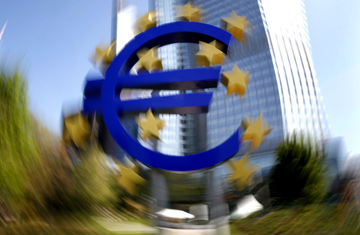
The Euro sculpture, in front of the European Central Bank in Frankfurt
(2 of 2)
Indeed, investors are turning their attention to other vulnerable euro-zone economies, and Standard & Poor's has downgraded both Spain and Portugal in the past two days. On Wednesday morning, the Lisbon stock exchange plunged by more than 6%. "Markets are running scared following fears of further contagion in the euro zone," said Ben Potter, an analyst at IG Markets in London, in a memo. Portugal's Prime Minister, José Sócrates, spoke of a "speculative attack on the euro and Portuguese debt," but met with the head of the main opposition during the day, before they jointly announced plans to bring forward some austerity measures that had been scheduled for 2011.
Once again, the key to the recovery operation is Germany. German Chancellor Angela Merkel says that unless there is a "sustainable, credible deficit-cutting plan on the table," she won't release funds. "You have to economize, you have to become fair, you have to be honest; if not, nobody can help you," she warned on Tuesday.
Picking up the tab for Greece was always going to be unpopular with German voters, and Merkel is facing pivotal regional elections next month. Several key German politicians have echoed the press in suggesting that Greece is the author of its debt mess and should be left to hang on its own rather than drag down the rest of the euro zone. Merkel said on Wednesday that much of the blame for the crisis should be placed on the European politicians who allowed Greece into the euro zone in the first place.
But if Merkel's reticence is politically understandable, it appears to have only exacerbated Greece's financial woes. The long back and forth about whether and how to implement the rescue package has in fact precipitated the market anxiety the Germans said they wanted to avoid all along. Alessandro Leipold, a former director of the IMF's European Department, says "meandering strategy and poor communication" has undermined the bailout. "The cacophony coming out of European capitals has destroyed market confidence," he tells TIME.
In Greece, the uncertainty has been greeted with strikes and street protests — making it even harder for the government to sell its austerity measures to the markets. "The markets have doubts that Greece can consolidate its finances," says Jakob von Weizsacker, an analyst at Bruegel, a Brussels-based economics think tank. "We are in uncharted territory."
It's a troubling time for Greece and the euro, with few signs of a turnaround. Many Cassandras warned of this day, but it's not over yet for this Greek debt drama.
